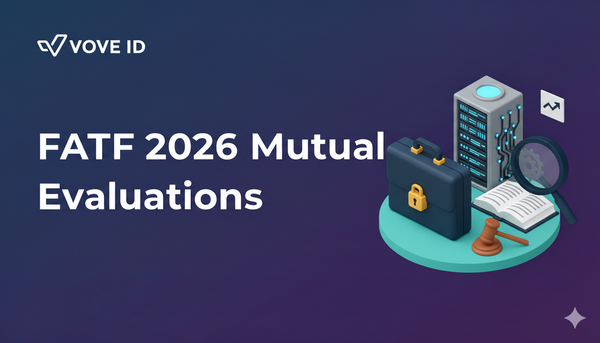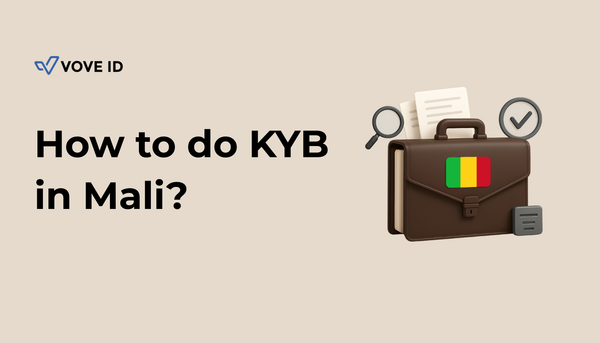AML Compliance in Saudi Arabia: A 2025 Guide for Fintechs and Regulated Businesses
Explore the 2025 AML compliance landscape in Saudi Arabia. Learn about key laws, regulators, challenges, and how identity verification solutions like VOVE ID support secure digital onboarding, foreign direct investment, and regulatory adherence.

In 2025, Anti-Money Laundering (AML) compliance is central to Saudi Arabia's financial ecosystem and its Vision 2030 goals. As the Kingdom diversifies its economy and expands digital infrastructure, cross-border transactions, fintech growth, and electronic payments are surging. This progress creates opportunities but also heightens risks of money laundering and terrorist financing. For fintechs, wallets, payment processors, and other regulated entities, strong AML compliance is both a legal requirement and a strategic asset that builds trust, attracts foreign direct investment (FDI), and supports sustainable growth.
Saudi Arabia’s regulatory landscape is evolving quickly, requiring businesses to balance customer verification, monitoring, and risk assessments. Advanced tools like VOVE ID, which deliver secure identity verification across MENA, simplify compliance by enabling fast digital onboarding while meeting strict standards. By automating critical checks, such solutions reduce risk without slowing growth.
This guide explores the Kingdom’s AML framework, key requirements, challenges, and the role of technology in enabling compliance for both startups and established players.
The Regulatory Framework
Saudi Arabia boasts one of the most robust AML and Counter-Terrorism Financing (CTF) frameworks in the Middle East, shaped by both domestic laws and international commitments. The Kingdom's efforts reflect a strong commitment to global standards, particularly those set by the Financial Action Task Force (FATF).
Key components include:
- Anti-Money Laundering Law (Royal Decree No. M/20 of 2017, with updates): This foundational law mandates obligations for financial institutions, Designated Non-Financial Businesses and Professions (DNFBPs) such as real estate agents and lawyers, and emerging fintechs. It requires thorough customer due diligence (CDD), record-keeping for at least 10 years, and prompt reporting of suspicious activities. Recent updates have emphasized technology integration for monitoring and enhanced penalties for non-compliance, including fines up to SAR 5 million (about $1.33 million) and imprisonment.
- Saudi Central Bank (SAMA): As the primary supervisor for banks, fintechs, payment service providers, and insurance firms, SAMA issues detailed AML/CTF guidelines. In 2025, SAMA continues to enforce rules on real-time transaction oversight and has introduced requirements for ultimate beneficial ownership (UBO) disclosure, effective since April 2025, to boost transparency.
- Capital Market Authority (CMA): This body oversees securities, investment funds, and capital market participants, ensuring AML compliance through licensing conditions and audits. CMA's focus includes preventing market manipulation tied to illicit funds.
- Saudi Arabian Financial Intelligence Unit (SAFIU): Operating under the Ministry of Interior, SAFIU collects, analyzes, and disseminates Suspicious Transaction Reports (STRs). In 2024, it handled thousands of reports, contributing to several high-profile convictions.
- Permanent Committee for Combating Money Laundering: This inter-agency body, chaired by the Minister of Interior, coordinates efforts among regulators, law enforcement, and ministries to align policies and respond to emerging threats.
Saudi Arabia has made significant strides in aligning with the FATF 40 Recommendations. As of 2024, the Kingdom is compliant with 17 recommendations and largely compliant with 21 others, earning praise for its political will and institutional strength. This rating underscores improvements in areas like risk assessment and international cooperation, though gaps in virtual asset regulation persist. The Kingdom's removal from FATF's "grey list" in 2019 and ongoing monitoring highlight its proactive stance.
Additionally, Saudi Arabia collaborates regionally through the Middle East and North Africa Financial Action Task Force (MENAFATF), hosting meetings and signing memoranda, such as the 2025 MoU with Kuwait for enhanced AML/CTF information sharing. These measures strengthen investor confidence and support FDI inflows by ensuring a transparent financial ecosystem.
Key AML Requirements for Businesses
To operate compliantly, fintechs and regulated entities must embed AML measures into their core operations. Here's a breakdown of the essentials:
- Know Your Customer (KYC) and Customer Due Diligence (CDD): Businesses must verify customer identities using reliable sources, including government platforms like Yaqeen (for expatriates), Absher (national portal), and Nafath (digital authentication). This includes collecting personal details, addresses, and source of funds.
- Enhanced Due Diligence (EDD): Applied to high-risk scenarios, such as politically exposed persons (PEPs), non-residents, or complex corporate structures. EDD involves deeper background checks, ongoing monitoring, and senior management approval.
- Transaction Monitoring: Implement automated systems to flag anomalies, like unusual patterns in cross-border transfers or trade finance, which are prone to trade-based money laundering (TBML).
- Record-Keeping: Retain all customer and transaction data for a minimum of 10 years, ensuring accessibility for audits or investigations.
- Reporting Obligations: Submit STRs to SAFIU within specified timelines—immediately for urgent cases. Failure to report can result in severe penalties.
- Internal Controls and Training: Develop comprehensive AML programs, appoint a dedicated Money Laundering Reporting Officer (MLRO), and provide regular training to staff on red flags and compliance protocols.
In practice, these requirements extend to emerging sectors. For instance, payment providers must integrate real-time screening against sanctions lists from bodies like the UN and OFAC. Best practices include conducting annual risk assessments and leveraging AI for efficiency.
Challenges in AML Compliance
While Saudi Arabia's framework is strong, businesses encounter several obstacles in 2025:
- Trade-Based Money Laundering (TBML): As a global trading powerhouse with ports like Jeddah handling billions in goods, Saudi Arabia faces elevated TBML risks through invoice manipulation or over/under-valuation. In 2022, authorities convicted six individuals for TBML schemes, sentencing them to a combined 31 years in prison, highlighting the issue's severity. Fintechs involved in trade finance must adopt advanced analytics to detect discrepancies.
- Virtual Assets and Crypto Risks: Despite growing public interest— with adoption rates rising amid global trends—cryptocurrency remains largely unregulated and considered unlicensed activity in Saudi Arabia. SAMA prohibits banks from dealing in crypto without approval, and a 2018 ban on virtual currencies persists, though frameworks are under discussion for 2025. This ambiguity exposes businesses to risks if users engage via foreign platforms, necessitating vigilant AML checks for any related transactions.
- Digital Transformation Pressures: The explosion of instant payments and mobile wallets requires real-time compliance, challenging legacy systems. With electronic payments accounting for around 75–79% of retail transactions in 2024 (up from 70% in 2023), the scale demands scalable solutions.
- Cost and Operational Burdens: Manual processes inflate expenses and delay onboarding, potentially driving customers away. SMEs, in particular, struggle with resource allocation for compliance.
Identity verification providers like VOVE ID address these by automating KYC and CDD, integrating with official databases for real-time checks, and incorporating biometric verification to enhance security and reduce fraud during onboarding.
The Role of Technology in AML
Vision 2030's emphasis on digital innovation extends to AML, where technology is reshaping compliance from a burden to an enabler. AI-powered tools minimize false positives in monitoring, while API integrations streamline data flows.
For fintechs, adopting regtech solutions is key. These include machine learning for pattern detection and blockchain for transparent record-keeping. In Saudi Arabia, SAMA encourages tech adoption, with guidelines promoting API-based verification against national databases.
VOVE ID exemplifies this by offering:
- Real-time customer verification against official sources, ensuring accurate KYC.
- Biometric integration for liveness detection and fraud prevention.
- Seamless API connections for digital onboarding, aligning with SAMA and FATF standards.
Such tools not only cut costs (potentially by 30-50% through automation) but also improve user satisfaction with faster processes. Looking ahead, expect greater emphasis on AI ethics and data privacy under evolving regulations.
In 2024, electronic payments made up approximately 75–79% of all retail transactions in Saudi Arabia, surpassing Vision 2030 targets ahead of schedule. This rapid digitization underscores the urgency of strong AML controls in a cashless society and has bolstered investor confidence by reducing illicit financial flows.
Future Outlook and Best Practices
As Saudi Arabia advances toward 2030, AML regulations will likely tighten around virtual assets and AI governance. Businesses should stay informed via SAMA updates and MENAFATF resources. Best practices include partnering with certified providers, conducting mock audits, fostering a compliance culture, and aligning policies with FDI expectations.
Conclusion
Saudi Arabia's AML framework in 2025 is comprehensive and adaptive, supporting economic growth while combating financial crime. For fintechs and regulated businesses, proactive compliance fosters trust, attracts FDI, and enhances competitiveness.
Leveraging solutions like VOVE ID for efficient identity verification enables secure scaling. In this regulated market, smart tech investments ensure long-term success.
Ready to simplify AML compliance in Saudi Arabia? With VOVE ID, you can onboard customers faster, reduce risks, and stay fully aligned with local and FATF standards.
Let’s build trust and growth together.




